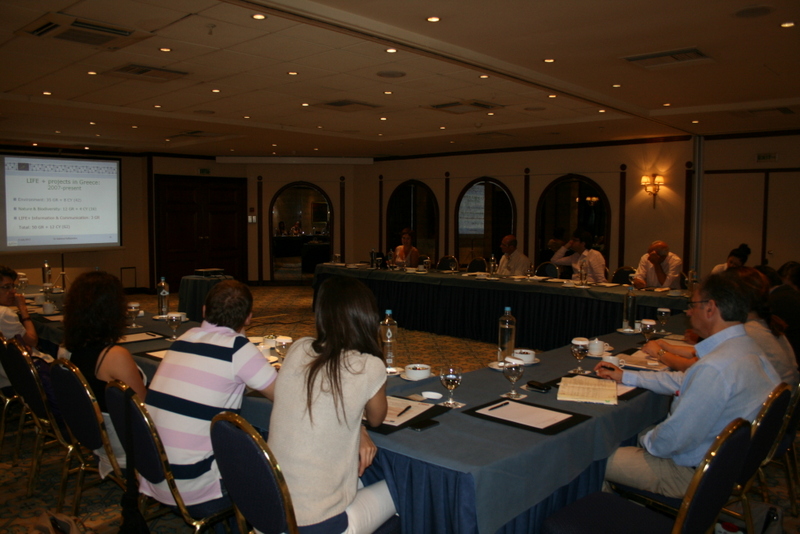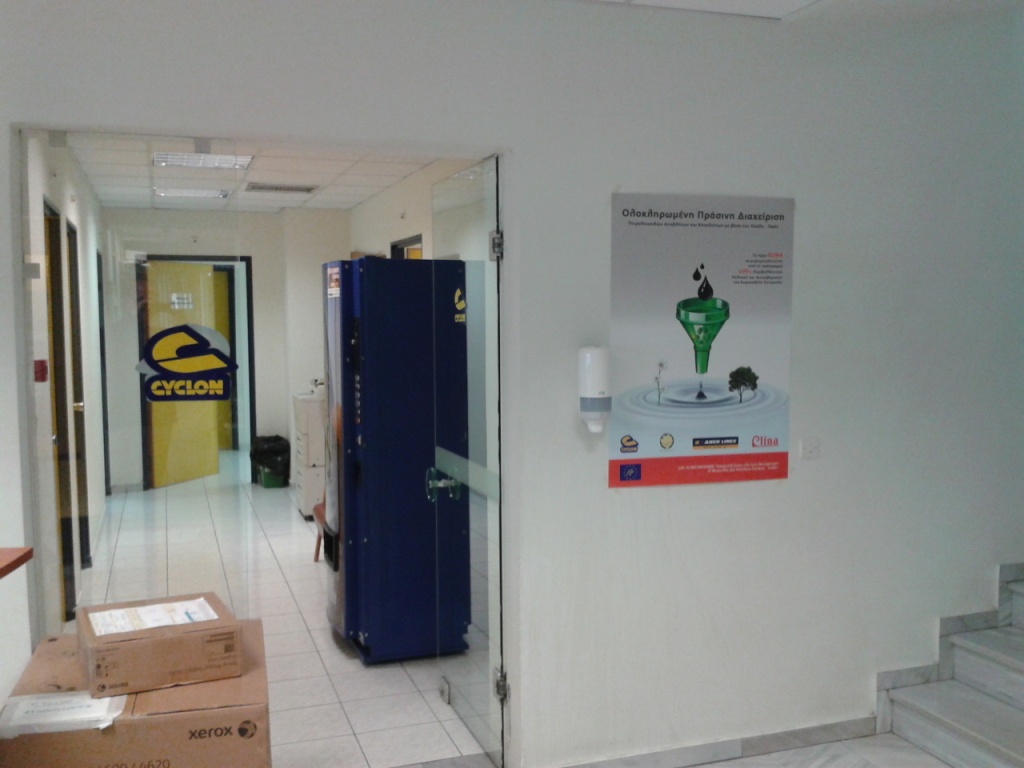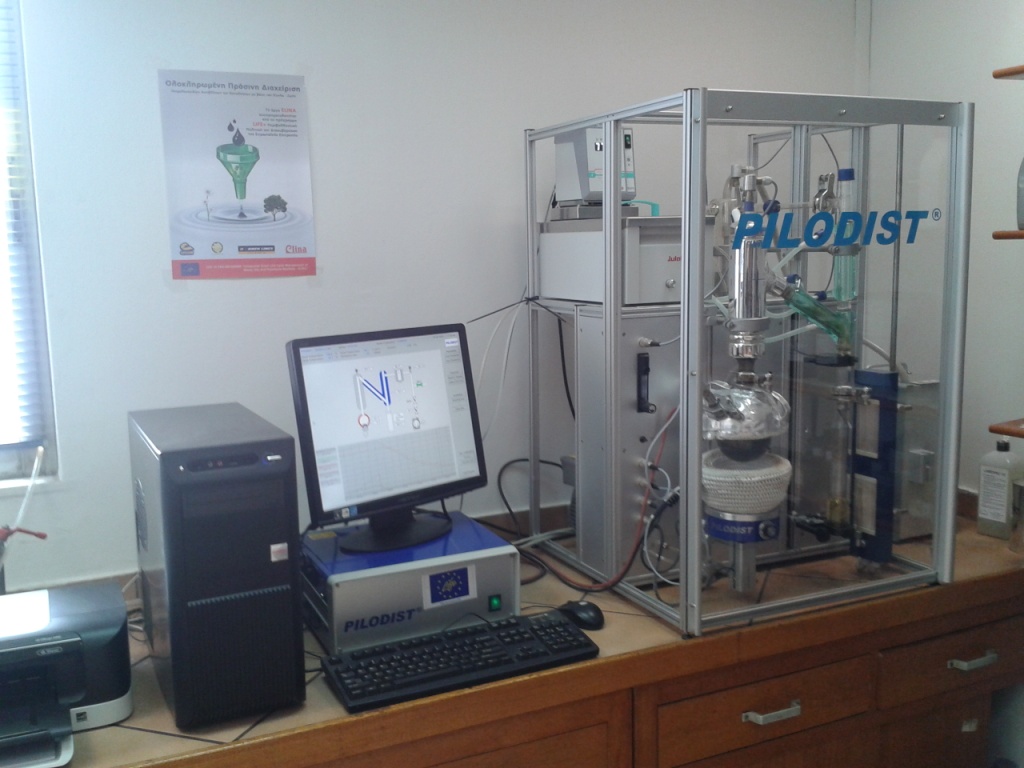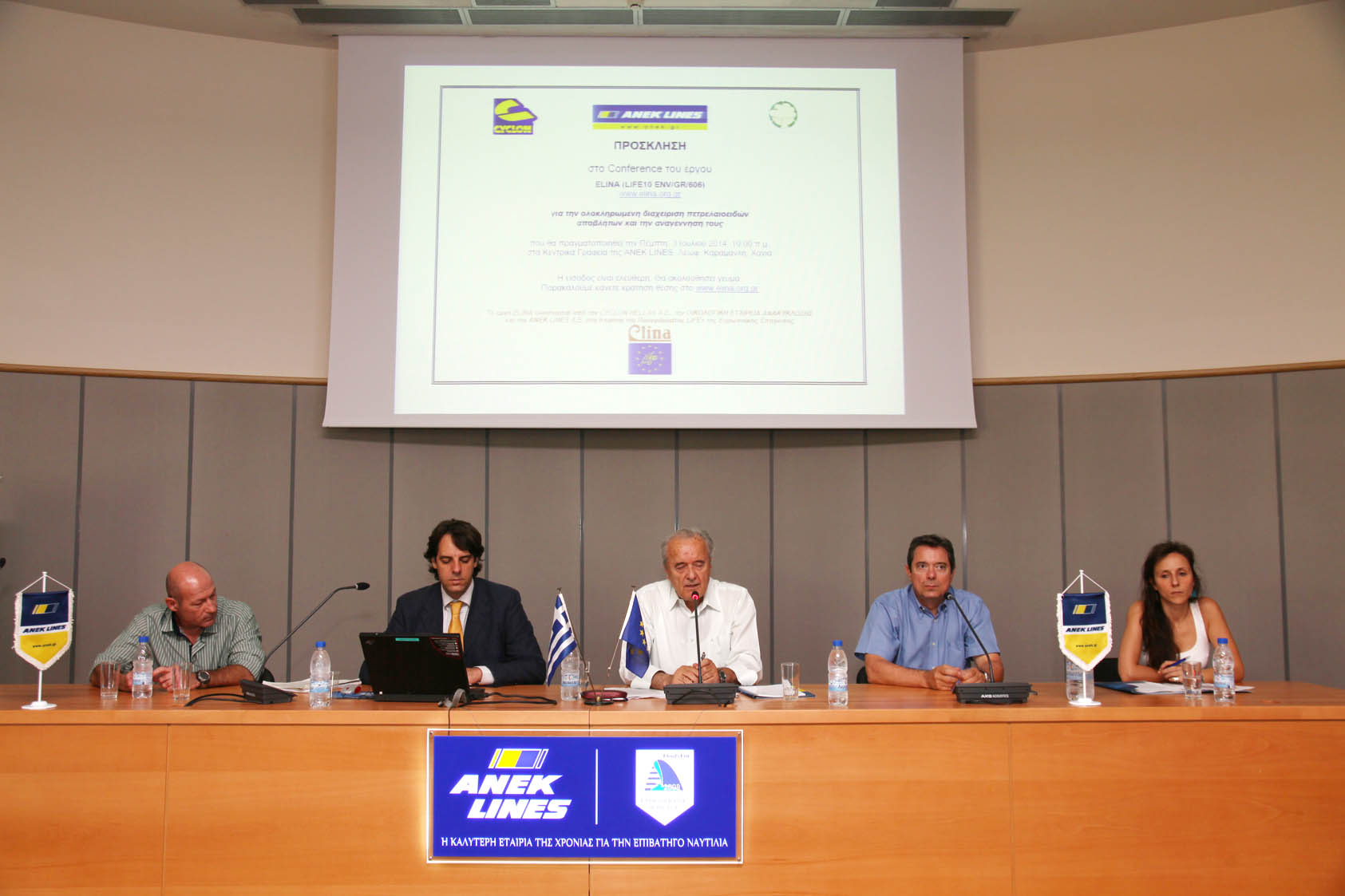March 2020 - ELINA
Α) Identity of the project
| Title/ N° |
Integrated Green Life-Cycle Management of Waste Oils and Petroleum Residues
ELINA - LIFE+10/ENV/GR/000606 |
| Duration |
01/09/2011 - 28/02/2015 |
| Budget |
Total budget: 2.040.875 € |
|
Beneficiaries |
Coordinator: Partners: |
| Location of activities | Greece, Italy |
| Website | |
| Contact |
Mrs Maria EMMANOUILIDOU / European Affairs Department Director |
Description/Aim
ELINA was a LIFE+ 2010 Environment Policy and Governance project aimed to address and implement the EU and Greek legislation relating to the integrated management of waste oils & petroleum residues (WO&PR), which are the largest petroleum derived waste stream.
The project’s coordinating beneficiary was LPC S.A., an industrial company active in petroleum lubricant re-refining and trading. There were two associated beneficiaries, ECOLOGICAL RECYCLING SOCIETY, NGO active in waste management and ANEK LINES S.A., one of the biggest passenger shipping companies of Greece.
WO&PR are defined as any semi-solid or liquid state waste streams consisting totally or partially of mineral oil or synthesized hydrocarbons, oily residues from tanks, oil-water mixtures and emulsions that contain primarily hydrocarbons mixed with water. WO&PR originate from different sources mainly ships; fuel bunkering facilities and large industrial plants, where they use hydrocarbons as fuels, lubricants, hydraulic / heat transfer / electrical insulating (dielectric) liquids etc. WO&PR represent a significant portion of the volume of organic waste liquids generated in Europe and worldwide.
In 2010, only in Greece, there were approximately 166.000 tonnes of WO&PR generated per year and the three legal management methods to handle this waste were:
- Collection, possible pre-processing (e.g. in ports or off shore, separated waters are discarded as is in the sea) and disposal at the crude oil refinery for re-refining.
- Mixing with wood-chips for the production of stable secondary fuels with a relatively low heat capacity for disposal in cement kilns.
- Disposal via trans-boundary transportation abroad.
The above mentioned methods have significant problems as WO&PR are sometimes mixed with waste lube oils (WLO), two waste streams with different recycling and regenerations requirements. Such practices affect the quality of fuels and lube oils that may be produced from re-refining of WO&PR and WLO respectively.
The main objective of ELINA was the sustainable integrated management of WO&PR by:
- Reviewing European and national legislation on WO&PR Management.
- Developing of a catalogue of sources and quantities of WO&PR produced in Greece.
- Identifying the chemical composition of the WO&PR produced from these sources.
- Setting-up of pilot demonstration collection system of WO&PR in Greece.
- Setting-up a separation at source of WO&PR from other waste streams in 2 ANEK LINES passenger vessels.
- Developing strategies through six (6) stakeholders meetings that brought together all the involved stakeholders towards a more collaborative rather than competitive perspective.
- Disseminating effectively the project aims, outcomes and raising public awareness on this issue.
During the 2016 EU Green Week, ELINA received the “Best LIFE Environment Project 2015 Award”.
Β) Best Practices
The review of the legislative framework, the sampling of various WO&PR, the identification of exiting WO&PR management methods, the pilot collection of these waste around Greece and the pilot separation at source in 2 passenger ships lead to the formulation of a detailed “Green Practice Guide”.
The “Green Practice Guide” includes a detailed list of procedures that will ensure the environmental friendly and sustainable management of WO&PR regardless of their originating sources. Furthermore, three (3) short versions of the “Green Practice Guide” were formed in order to customize WO&PR management in accordance with their three major originating sources, namely WO&PR from Ships, WO&PR from Industries, WLO from both ships and industries.
In particular, the “Green Practice Guide” includes the following:
- Characterization of WO&PR based on their primary production sources.
- Best available techniques (BATs) regarding WO&PR in Greece, including the source separation scheme for the shipping industry already developed and applied by ANEK LINES onboard the ships HELLENIC SPIRIT and OLYMPIC CHAMPION.
- List of procedures, activities, means, infrastructures, equipment and human resources needed for the environmental friendly and sustainable management of WO&PR.
- Suggestions for optimizing WO&PR management by increasing the collected quantities and upgrading the recycling potential of those wastes.
- Presentation of the most effective and efficient technological solutions regarding the transformation of WO&PR into useful primary and/or secondary end products.
- Regulating framework regarding the procedures in port reception facilities.
- Mapping of the most crucial terms and conditions that regulates WO&PR management as described in International Conventions, European Directives, European Regulations and National Law.
C) Results
The results and environmental benefits that arose from ELINA are:
- List of EU and national legislative framework that regulates the management of WO&PR and WLO.
- Catalogue of sources and quantities of WO&PR produced in Greece from the shipping sector and industrial sectors.
- Excessive sampling and identification of the chemical composition of WO&PR produced from 604 sources in Greece.
- Collection and regeneration of 7.236 tonnes of WO&PR from 487 locations in Greece.
- Pilot implementation and demonstration of a source separation scheme for WO&PR and WLO generated on two ANEK LINES’s high speed ferries (HELLENIC SPIRIT and OLYMPIC CHAMPION).
- Pilot dehydration / concentration of WO&PR on-board and delivery thus to Port Authorities less wastes.
- 6 stakeholder forum meetings for the strengthening of national producer responsibility legislation in this field. Representatives from at least 100 stakeholders participated in 6 meetings.
- Catalogue of existing infrastructures for environmental sound and certified processing of WO&PR including proposals for expanding/ improving those infrastructure.
- A general WO&PR Green Practices Guide and three short versions (Green Practice Guide for WLO, for WO&PR from Ships and for WO&PR from Industries).
- Data base of 1.128 stakeholders.
- 12 e-newsletters produced and distributed to stakeholders.
- 11.000 leaflets and 2.000 posters produced and distributed to stakeholders.
- 1 dissemination event in ANEK’s headquarters, Crete with more than 70 participants.
- 1 final dissemination event in Athens, Greece with 66 participants.
- Participation in policy formulation during the 2015 revision of the Greek National Waste Management Plan, in order to raise awareness on WO&PR sustainable management.






